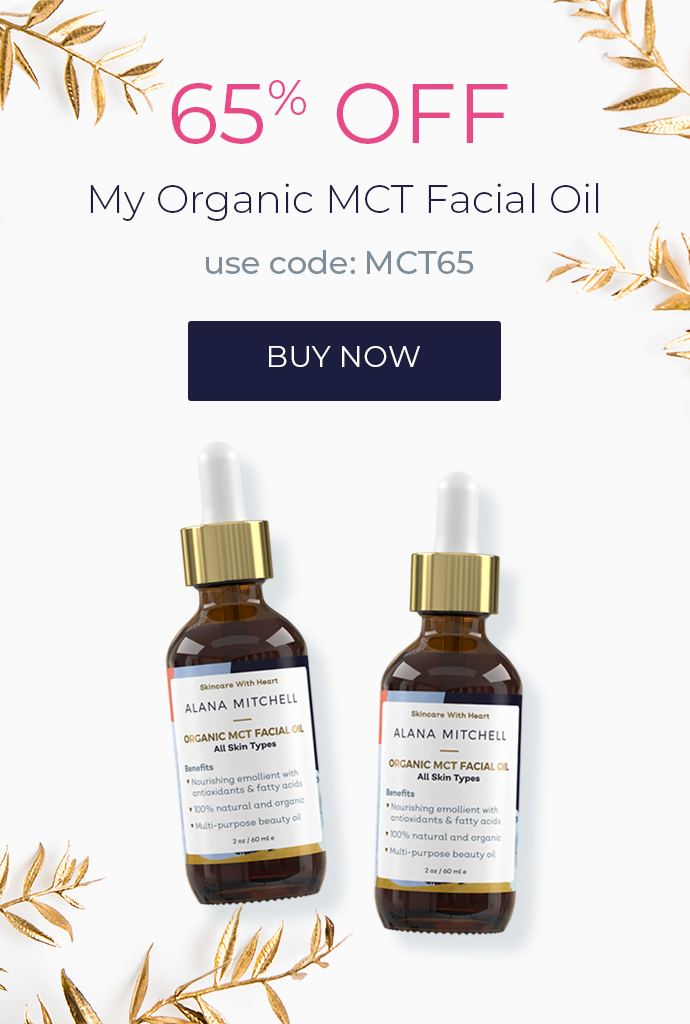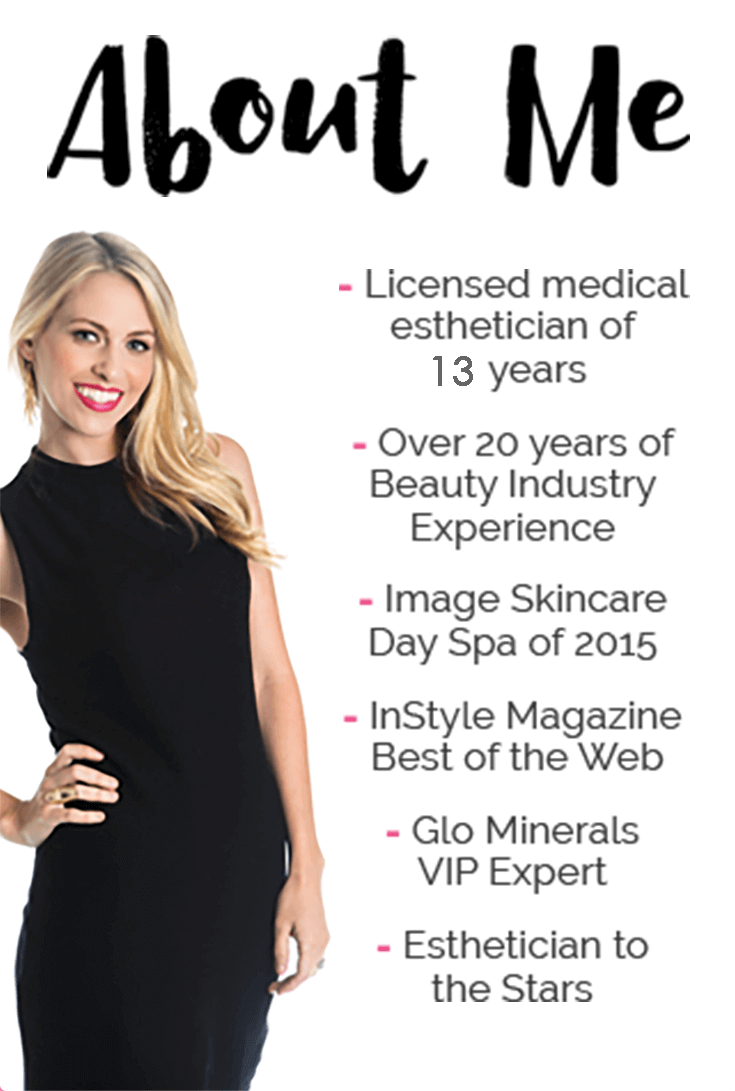What Should You Be Using In Your Skin Care Routine?
Take my quiz and get personalized recommendations from a
licensed esthetician!
Hey, City Girls! Here Are Some Shocking Ways That Pollution REALLY Affects Your Skin
Life in the city can make you feel alive and full of energy.
Everywhere you look, the world is hustling and bustling all around you.
What’s not to love about it?
Well, your skin might not be as in love with urban life as you are.
Air pollution can contribute to premature aging by accelerating the development of wrinkles and age spots, according to new scientific studies.

Toxic fumes have a visible effect on skin in larger cities like NY and LA, with some skin conditions like eczema worsening in city environments.
I live in Southern California, which means sitting in city traffic is inescapable!
I'm frequently in LA and experience pollution firsthand - so I use a variety of steps to protect my skin, which I'll share with you here.

While studies that link pollution to skin damage are just getting started in helping us all understand, pollutants are known to pass easily through the skin and they have quite an impact.
According to Frontiers in Environmental Science, these pollution agents activate multiple pathways of inflammation which can lead to redness and sun spots.
Their recent research determined that exposure of the skin to pollutants can also lead to aging and allergic skin conditions like atopic dermatitis (a surface-level rash caused by irritants), eczema, psoriasis, acne, and even skin cancer.
What Kind Of Pollution Are We Talking About Here?
Formally, the Environmental Protection Agency (EPA) defines pollution as the following:
Air pollution consists of gas and particle contaminants that are present in the atmosphere. Gaseous pollutants include sulfur dioxide (SO2), oxides of nitrogen (NOx), ozone (O3), carbon monoxide (CO), volatile organic compounds (VOCs), certain toxic air pollutants and some gaseous forms of metals. Particle pollution (PM2.5and PM10) includes a mixture of compounds that can be grouped into five major categories: sulfate, nitrate, elemental (black) carbon, organic carbon and crustal material.
These little particles may be microscopic, but the damage they are capable of doing is significant.
Air pollution is probably one of the most serious environmental hazards happening right now for a variety of health and safety reasons.
Pollution is "man-made," meaning that it's caused by human activity.
Things like mining, construction, transportation, industrial work, and agriculture all contribute to the pollution factor.
If you're not walking out in public, poor air quality can still get you in other places.

For a little more 411 on what pollution is, according to the National Resources Defense Council, the two most common types of air pollution are:
- Smog - occurs when emissions from combusting fossil fuels react with sunlight.
- Soot - made up of tiny particles of chemicals, soil, smoke, dust, or allergens in the form of gas or solids that are carried in the air.
The sources of smog and soot are similar because both originate from transportation, factories, power plants, and anything that requires fossil fuels like coal, gas, or natural gas.
The Most Polluted Places
Where you live can definitely impact how your health and skin is affected by pollutants.
According to TIME Magazine, these are the cities with the most pollution:
- Los Angeles-Long Beach, CA
- Visalia-Porterville-Hanford, CA
- Bakersfield, CA
- Fresno-Madera, CA
- Sacramento-Roseville, CA
- Houston-The Woodlands, TX
- Dallas-Fort Worth, TX
- Modesto-Merced, CA
- Las Vegas-Henderson, NV
- Phoenix-Mesa-Scottsdale, AZ
Being so close to LA myself, I take my skincare extra seriously when traveling to and from the city - especially when I spend an extended period of time there.
California may be the Golden State, but when it comes to the cities and more populated areas, the air quality is far from golden most of the time.
So, What Does Pollution Do To The Skin?
People living in areas with higher levels of air pollution have been found to experience more skin problems than those who don’t.
A recent study tested subjects who live in Mexico City versus a more rural area of Mexico.
It found that those living in the city produced more oil in their skin than those who live in the “country.”
Since we can’t see pollution, per se, most of the time, it’s easy to forget it exists.
Especially if you live in an area with less-than-perfect air quality - you’re just used to it.
And most people tend to think about pollution’s effect on our hearts and lungs (for valid reasons, obviously!).
But let’s talk about what it does to our skin.
When tiny bits of smoke, soot, acid, and other pollutants are released into the air from various sources, the contact it makes with your skin is deep.

These pollutants don’t just sit on the outer layer of your skin.
They infiltrate all the way into the deeper layers of your epidermis, which can cause dehydration and lead to lost elasticity and increased chance of wrinkles.
Are you sufficiently grossed out?
Thinking about these microscopic, grimy pollutants just seeping into our skin isn’t exactly a relaxing mental image.
But education is the key to prevention when it comes to ensuring your skin is properly taken care of, right?
Right!
Air pollution also contains microscopic contaminants that help produce "free radicals."
Free radicals can strip the skin of barrier lipids, which help retain moisture and keep out dirt and other impurities.
These barriers act as an automatic protectant, so a compromised skin barrier can lead to all sorts of unwanted results.
Premature aging, skin damage, hyperpigmentation, and increased skin sensitivity can all be caused by long-term exposure to air pollution.
I know what you’re thinking: “Yikes.”
It’s a lot to take in, especially when we aren’t always in control of how much pollution we’re exposed to.
We can’t just stay inside our homes and live our lives in a protected bubble, can we?
Flare-Ups
Pollution in the air can act as an irritant that triggers regular flare-ups of eczema, psoriasis, acne, and rosacea.
Here’s how air quality affects skin conditions.
- Eczema and psoriasis
The unnatural elements of pollution are constantly coming into contact with your skin, causing stress due to oxygen imbalance. This stress weakens your skin, allowing toxins through the barrier and causing immunity issues. Because people with eczema and psoriasis already have sensitive skin, pollution can do even more damage.
- Acne
Air pollution is made up of extremely small solid particles or liquid droplets. It can be composed of any number of toxins, including soil, organic chemicals, metals, or dust. If your skin is acne-prone, having these toxic particles seeping into your pores doesn’t do your skin any favors. Your body responds to these particles as it would any other inflammation, and acne is the result.
- Rosacea
Pollutants in the air cause a disruption to our skin’s healthy balance due to oxidization stress. This disruption -- while triggering any of the above conditions -- also can trigger the redness and swelling associated with rosacea.

Let's Talk Makeup and Pollution
Now there are two things that don’t sound like they’d be paired up together in a blog, huh?
Well, with all this scientific research and data, I didn’t want you to think I forgot about you, The Everyday Makeup Wearer.
Wearing makeup can help create a barrier between your skin and the concrete jungle, which is great.
Bonus if it includes SPF!
Below are some options that will enhance your natural beauty and protect your skin:
- Primer
- Tinted Sunscreen/Moisturizer
- BB or CC cream
- Liquid or powder foundation
- Setting spray or powder
When it comes to application, layer your products from thin to thick to get the best results.
But don’t forget -- the makeup that sits on our face all day collects traces of our daily environment.
Removal is so so so important!
You don't want to sleep in your daily grime. Yuck!
Read on for more tips on how to get the best cleanse!

How To Properly Protect Your Skin From Pollutants
Korean skincare brands use the term "polluaging" to describe the wrinkles, sagging skin, and age spots caused by pollution, and they make products to specifically target these issues.
Although these anti-pollution products are now making their way over to the US, you don't need to immediately go out and buy one to protect yourself.
So, now we know that pollutants are less than ideal for our skin, what steps can we take to protect our pretty face?
Cleanse Thoroughly and Often
This is always the first step in any skincare regimen I recommend, but effectively cleaning your skin is crucial if you’re regularly exposed to urban pollutants.
- Pre-game Prep
If you've used sunscreen, moisturizer, or any form of makeup, this is the first step to remove the day from your face. Start with a cotton pad and some micellar water, or a simple makeup wipe. This helps ensure your face wash isn't just mixing these leftovers into your pores. Gently remove any eye makeup with a separate wipe or with a cotton pad and some eye makeup remover. Gently rub your eyes from side to side until the makeup is safely removed.
- Find a Good Foam
Nighttime is when the real cleansing work needs to happen because you've been exposed to air contaminants all day. A gentle foaming cleanser is my go-to for gently but effectively removing everything. Depending on your skin type, a mild cream cleanser works, too! Get everything off your face without over-scrubbing, which can cause further irritation and exacerbate existing skin conditions. I'd also recommend using an electronic facial brush.
Toning Is Your Friend
Those with dry skin or sensitive skin types may shy away at the mere thought of using a toner, but there are so many options available to address your skin's needs!
If you live in the city, using toner is a great way to lift any remaining grime from your face and keep it clean and bright.
It also shrinks the appearance of pores and restores your skin's natural pH balance.
Counteract the Pollutants
When pollution works its way into our skin, it can create free radicals.
Free radicals are unstable molecules that wreak havoc by causing inflammation -- no thank you!
On a more serious note, free radical damage can eventually lead to cell mutation, which can lead to cancer.
So it’s best to counteract these free radicals as best we can, especially when we’re exposed to air pollutants.
Enter antioxidants!
They can neutralize and counterbalance where needed, which means antioxidants are one of the best treatments for preventing or treating free radical skin damage.
Try using an antioxidant-enriched facial serum to help protect skin.
Aside from finding antioxidant-rich serums, you can also go the easy and natural route by eating things like leafy greens, beans, and blueberries.
Moisturize to Seal the Deal
In my opinion, moisturizer is the most important part of your skincare routine!
Think about everything our skin goes through.
Our skin can become dehydrated and easily dried out - but here comes moisturizer to save the day!
Using a lightweight formula after a good cleanse not only helps soothe your skin and keep it hydrated, it also acts as a protective barrier against airborne toxins.
It can also serve as a great makeup primer, too.
If you have oily skin, fear not!
Moisturizer provides your skin with hydration, so it doesn't overcompensate for dry skin and end up producing more oil.
I can guarantee that there's a lightweight moisturizer out there for you!
Use Sunscreen (I will never stop saying this)!
Because pollution has such a serious effect on the entire ozone, we’re more susceptible to the damaging rays of the sun.
Contrary to popular belief, we’re not even safe on cloudy days.
If you already have acne, hyperpigmentation, or inflammation of any kind -- it can be accelerated based on UV exposure.
Not to mention overexposure to UV rays can also lead to skin cancer.
I can’t recommend this or stress this enough: Find an SPF of 30 or higher for daily use.
Better yet, find one with antioxidants in it!
Positive Lifestyle Choices
Making some adjustments and developing some habits can help lessen the impact all that icky stuff has on your skin!
- Don't smoke - it's just another form of air pollution! Elastin and collagen are damaged which leads to premature sagging and wrinkling.
- Stay hydrated - water helps skin from the inside out! It plumps skin, improves elasticity, and provides a glow.
- Eat nutritious foods - vitamins and nutrients, such as omega-3s, vitamins A and C, and antioxidants all work to protect skin. They can be found in fish, leafy greens, and citrus fruits.
Below are my product recommendations for you city girls!
Product Roundup
Alana Mitchell Foaming Pumpkin Cleanser
Alana Mitchell Daily OC Cream Cleanser

Alana Mitchell Daily Vitamin C Moisturizer
 Dermalogica Soothing Eye Makeup Remover
Dermalogica Soothing Eye Makeup Remover
Rhonda Allison Antioxidant Complex Serum
Image Skincare Biomolecular Anti-Aging Radiance Mask Foreo Luna Mini 2
Foreo Luna Mini 2
Epicuren Zinc Oxide Sunscreen SPF 27
Glo Minerals Protecting Powder SPF 30
Final Thoughts
There's no need to pack up and move!
Practicing proper protection offers your skin the best chance at combating the effects of pollution.
As I've said before, giving your skin the TLC it needs is the best way to prevent skin damage and aging.
Luckily, it's easy and effective!
And hey, since pollution is environmental, we can at least have some control over how it impacts our skin.
Do you live in or near a city? What are some of your skincare secrets? Let us know!
Top Brands
New Brands

Recent Posts

Are You Taking the Right Steps to Care for Your Skin?
Take the Quiz
Skincare Secrets!
10-step guide for healthy, beautiful skin after kids.
100% privacy. I will never spam you!



















